#in case it becomes… Relevant… in the future
Explore tagged Tumblr posts
Text
…sometimes when i’m making selfship arts i wonder if it looks like my oc is just a sniper oc… because i look like him quite a bit irl :> doesn’t matter. i ship them all
#self shipping#🌊#fav ship plus Me i’ve spoken on it before… power move#i do not in fact have a sniper oc btw#i just have a mullet irl. and style the sideburns in that way. and always wear a vest#a real mullet too the back is waist length … its actually really hard to get it all under a gas mask#i COULD make a sniper oc but i never play as him… much more likely to make a pyro oc :3#but that would be based on my dream loadout if anything.#save#in case it becomes… Relevant… in the future#for now#just a 10th class oc is enough for me currently (<- guy who only has small imagination)#EDIT: OH GREAT. IT'S HAPPENING. pyro oc tag is now:#spikes#oc tag
2 notes
·
View notes
Text
FUGG, Lighter's banner is the one after this one NOT THAT I CARE OR ANYTHING, but @adoredbyalatus @dearly-beeloved would you guys be interested in me streaming ZZZ in the next few days?
#it's been forever and i need to accumulate 'bring the loser home' polychromes#also just in case the void hunters become relevant in the future because some of them are dae coded if i've ever seen them
5 notes
·
View notes
Text
Alright it’s that time again, general ramblings post about Ep 5
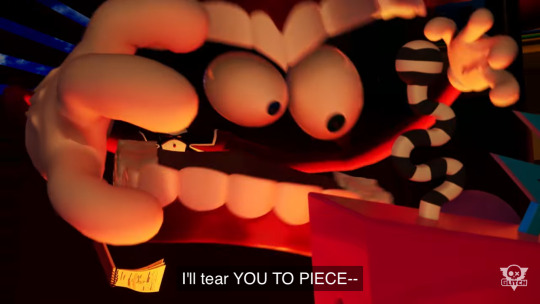
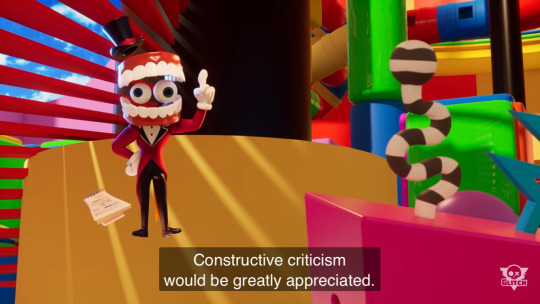
I never thought certified silly billy Caine would ever actually scare me but I was proven wrong within the first minute. We definitely all expected him to become really unstable this episode but I can’t imagine many of us were thinking he was going to become violent. (And not in his ‘oblivious to the pain he’s causing others’ way.) Really scared for the players in the future episodes not gonna lie.
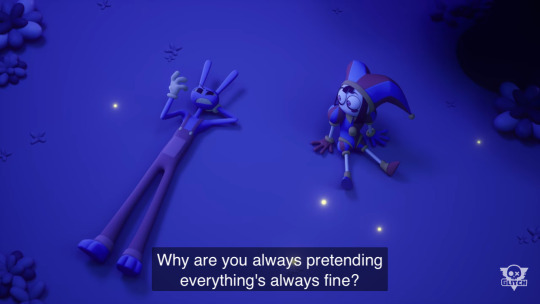
It’s not like it’s a huge shock a scene like this happened but I do find it very funny I wrote a one-shot with a nearly identical plot to this back in January
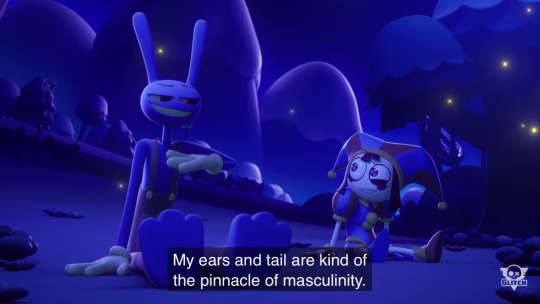
Also just…Jax and Pomni friendship!! I’ve been holding out for their love/hate frenemies bond to develop and I’m honestly surprised it’s happening this soon but I’m not complaining. I read them as having a purely platonic ‘bickering best buds’ dynamic but I’m proud of the funnybunny shippers for eating with this episode
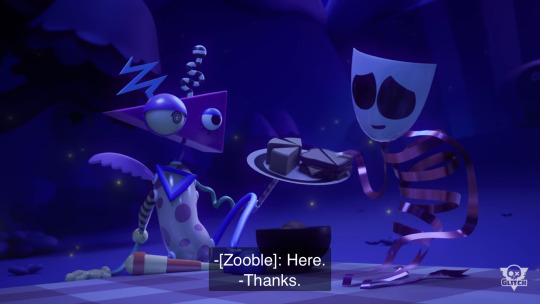
Also where do I even start with these two. They’re just adorable. In a sea of messy emotions and messier relationships it’s so refreshing to see these two just…have a healthy friendship, support each other and enjoy each others’ company. They’re so in love I will die on this hill
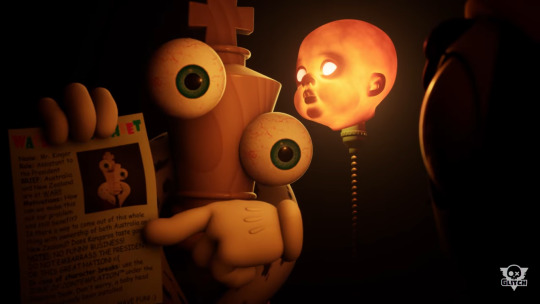
I liked Kinger pulling Pomni under the desk to talk to her since he thinks better in the dark! Honestly very sweet of him. Their dynamic makes my heart happy
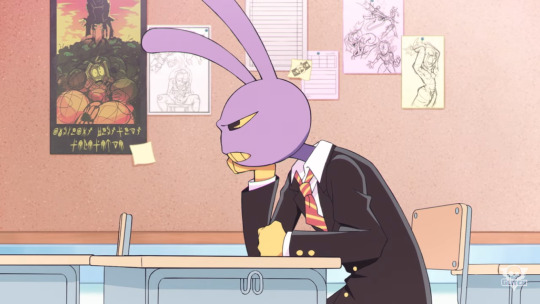
Was just trying to find a good screenshot of the anime segment to talk about how funny it was but then I spotted TGD Easter eggs on the bulletin board! Just thought it was neat
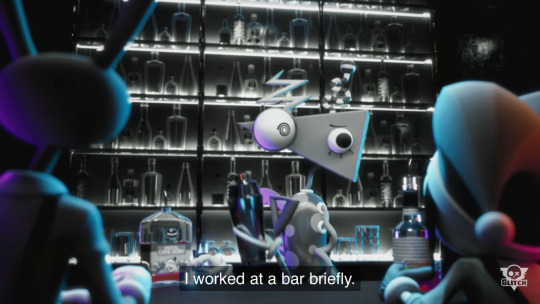

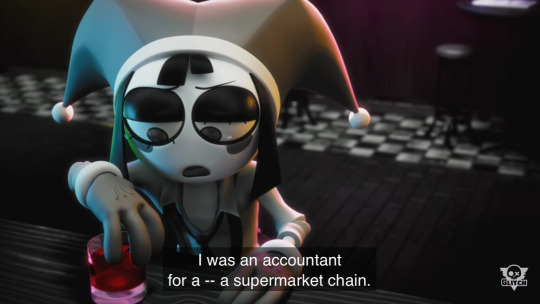
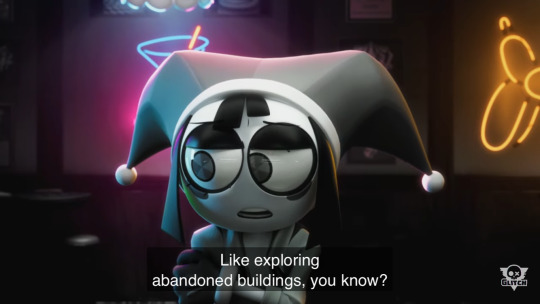
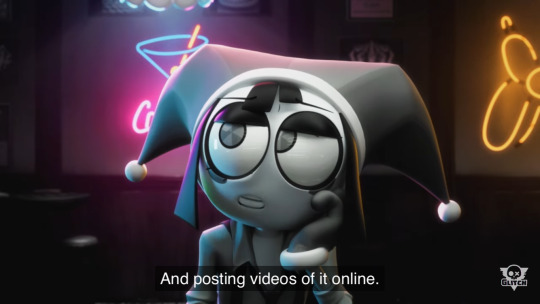

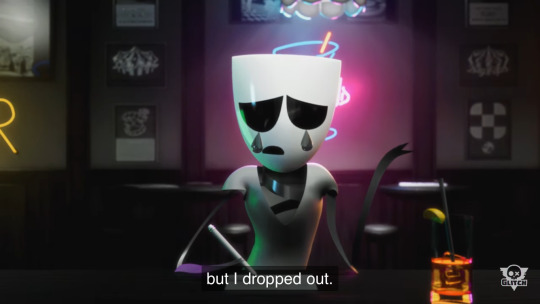
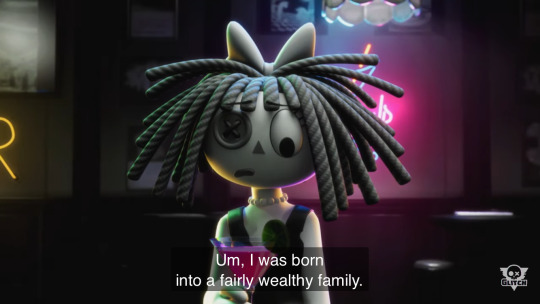
I do find it both kinda funny and fascinating how all of these lines up with the fanbase’s most popular headcanons. I know a lot of this could just be inferred from the previous episodes (and in Pomni’s case her being an accountant was just confirmed outright before) but the fact these all lined up nearly to a T to the most common interpretations of them just goes to show how well the fanbase knows these characters. It took wading through some content farming but Goose struck the right audience eventually

Found it interesting that Pomni didn’t vote for Jax to be put in the maid dress. They bonded pretty damn quick lol
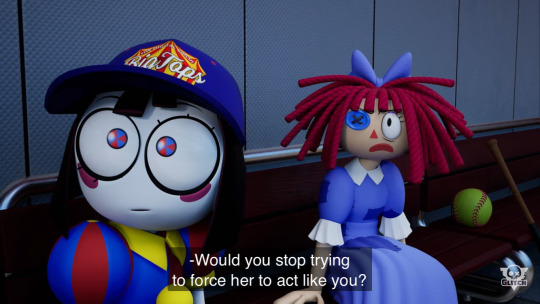
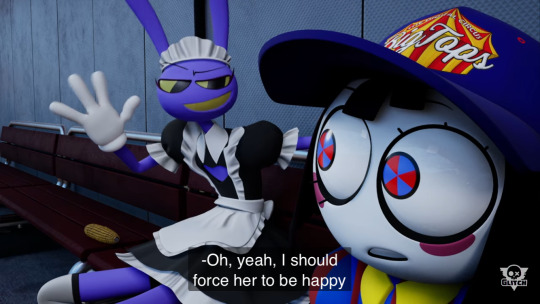

I think all of us were expecting a scene like this at some point but I wasn’t thinking Pomni was going to be involved like this. It’s interesting how Jax and Ragatha are basically doing a tug-of-war over her, denying her of her agency and trying to project their own ideals onto her. I expected Pomni to play peacekeeper but I wasn’t expecting her to be a pawn in the middle of this argument. Honestly that’s just scratching the surface of this scene’s nuances, Jax and Ragatha are such fantastic foils to each other and I am very glad Ragatha finally got to have her crash out moment
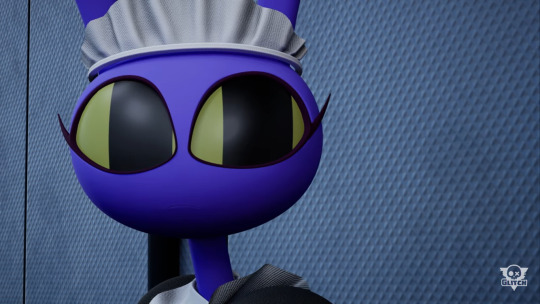
Also I know there is a TON of analysis that could be made just off this one expression but just look at him for a moment. stupid man
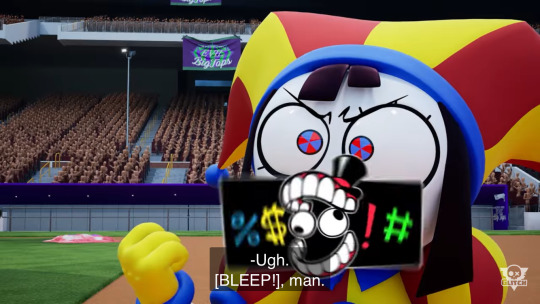
I did find it very funny that Evil Pomni curses with basically the same frequency I write regular Pomni lol
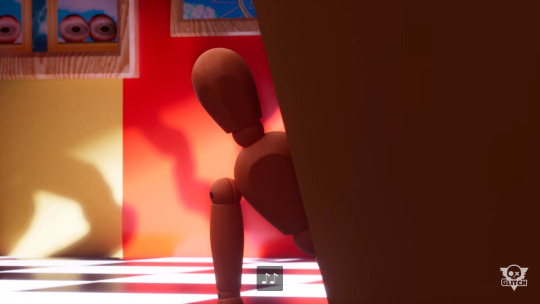
This fucking mannequin dude…I was on the fence if they were actually plot relevant or just a running Easter egg and it definitely looks like the former’s the case. Can’t wait to find out what this guy’s deal is

Also how dare they call me out like this
#tadc#the amazing digital circus#tadc spoilers#tadc episode 5#tadc pomni#tadc ragatha#tadc jax#tadc gangle#tadc kinger#tadc zooble#tadc caine
1K notes
·
View notes
Text
2nd watch, a few new details:
On the first watch, I was like "of course Owen couldn't go with Maddy the first time, her mom had cancer :(". But this time I caught that Maddy went missing "a few weeks" after Owen's mom died. Owen had nothing left to stay for. Maddy probably waited around for those extra weeks, just in case Owen had a change of heart. And yet,
The first time we see the dress flashback, it's through what seems like a relatively objective perspective. The second time we see it (as they walk to the grave), the memory has taken on the vhs-fuzz and aspect ratio of the pink opaque tapes. The real becomes unreal, an impossible fantasy, "kid stuff"
Happened to see a captioned screening this time, and the Tara from the streaming version is described as "Fake Tara."
The tv guide page Owen finds by the electrical field is for "season 6, episode 1: Escape from the Midnight Realm"
Mr. Melancholy and Maddy's ex friend who accused them of dykery ("like a secret agent sent to ruin my life") were the same actor
All the school hallway motivational posters are thematically relevant, but this time I caught the "the only easy day is yesterday" and "courage: without it, no other virtues matter" ones
You can see the emotional shifts between Owen and Narrator Owen in real time (ie, Owen looking distraught as the firefighters surround Maddy's tv, then dropping the expression and looking coolly into the camera as she starts to narrate again)
There's an interesting recurring thing where audio from the near "future" plays over footage from the "past." ie, we hear Maddy's planetarium monologue, while we watch Owen still walking to the school to meet them. Something about time not working right, something about Owen playing back memories that already happened, something about inevitability and walking down a path with a fixed ending
Void High School, or VHS
5K notes
·
View notes
Text
POTS
Spencer Reid x Female Reader
Summary: Y/N suffers from POTS and experiences a fainting spell at work, luckily Spencer is there to catch her.
TW: Mentions of medical conditions/fainting, medical terms, pre-established relationship.

Y/N had been diagnosed with Postural Orthostatic Tachycardia Syndrome just under a year ago. She had been experiencing symptoms for quite a while before her diagnosis and it felt like everything finally made sense. Y/N had been managing her condition well up until this point, but she still had bad days.
Y/N was a member of the Behavioral Analysis Unit and she was a profiler. She didn't carry a gun, her intellect was her weapon and she liked it that way. Guns had always made her uncomfortable and Y/N preferred to be behind the scenes instead of on the front line.
Y/N continued to add to a relatively impressive knowledge base over the years, adding degrees in relevant fields. Y/N currently possessed Doctorates in Abnormal Psychology and Behavioral Psychology, she had a Degree in both Criminology and Criminal Psychology. She also had a Graduate degree in Criminal Justice and was working on getting her Bachelor's degree in Child Psychology.
Her resume was impressive and Gideon hired her on the spot, he knew that she could contribute a large wealth of knowledge to the team.
Y/N clicked with Spencer quickly and they became inseparable as time went on. They sat beside each other in the bullpen and talked every day without fail.
It took three years of working together before Spencer was finally able to admit that he had feelings for her. Spencer asked her out on a date, taking her to dinner at their favorite restaurant before watching a movie at the theater.
It was perfect and they had been together since.
Y/N and Spencer had always done their best to keep their relationship separate from their work life. Y/N tended to be a rather private person and Spencer was completely on board with following her lead on the matter.
Hotch was the only one who knew about their relationship, they informed him and human resources but kept things between them for the most part.
Spencer could definitely see a future with Y/N, he knew that they would have to tell the team at some point but it was nice to have this one thing be entirely their's. It was hard work to keep a secret from a group of people who made skilled observations for a living.
Since they started dating, Spencer had become rather skilled at noticing when her condition was giving her a rough time. Y/N had learned that standing for long periods of time, being in hot places, strenuous exercise and changing positions too quickly had the biggest effect on her. Her heart would race and her blood pressure would plummet which could lead her to get incredibly dizzy or even lose consciousness.
Spencer always made sure to monitor her fluid and salt intake, offering snacks to her throughout the day to make sure she was alright. He was incredibly caring and went about it in a way that didn't make her feel like it was a chore to him.
...
Y/N made her way into the briefing room, taking her seat at the table beside Spencer. Hotch followed closely behind her, sitting down and opening his file. Garcia went through the briefing, clicking through the crime scene photos as she went over the case.
"Alright, we need to get to Texas. Wheels up in thirty," Hotch stated, closing his file and standing up.
The team followed after him, closing their case files and exiting the conference room to get their bags. Spencer stood up, holding his copy of the file with his bag slung over his shoulder, lingering by the table as he waited for Y/N.
Y/N stood up from her seat, closing her eyes as a sudden wave of dizziness hit her. She swayed on her feet, Spencer dropped his bag and file, stepping forward quickly. He wrapped his arm around her waist, resting his other hand on her head and holding her close to his chest.
"Spencer," She mumbled, heart pounding in her chest as she lost consciousness.
Her knees buckled and her body leaned heavily into his chest, Spencer eased her down to the floor carefully. He laid her on her back, shrugging off his blazer and laying it over her body.
Spencer pulled a chair over, elevating her legs to help the blood return to her heart. He shifted back over to her head, sitting by her side and providing silent support as he waited for her to come back around.
Spencer's fingers settled on her wrist, fingers resting on her pulse and finding himself shocked at how high her heart rate was. Garcia made her way back into the room, she gasped softly when she saw her coworkers on the floor.
"What happened? Is she okay?" Garcia asked, Spencer nodded.
"She has a condition. When she stands up to fast, her heart rate speeds up and her blood pressure drops," Spencer stated.
"Do we need to call an ambulance?" Garcia asked, Spencer shook his head.
"She'll be fine. Just takes her a minute to come back around," Spencer assured.
"I can get her some water if that would help," Garcia offered.
"That would be great. Thank you," Spencer stated, she nodded and rushed back out of the room.
Spencer looked down at Y/N, he could feel her heart beat returning to normal. Y/N shifted, eyes fluttering open as she stared up at him.
"You're okay," He assured with a gentle smile.
Y/N shifted, settling her legs on the floor and sitting up slowly. She made a soft noise, closing her eyes as her vision swam once again.
Spencer shifted up behind her, gently guiding her body back to rest against his chest, "Don't rush," He said.
Her head dropped back onto his shoulder, her eyes drifting closed, "I don't feel good," She mumbled.
"I'm sorry... Garcia is getting you some water and I have a couple snacks in my bag," Spencer offered.
"Did Garcia see me pass out?" Y/N asked softly.
"No, it was just you and me in here. She came in after," Spencer said, Y/N nodded.
Garcia made her way into the conference room, "Oh, honeybunch, you're back. I brought you some water," Garcia said, holding out the cup of water.
Spencer took the cup from her hand, holding it up for Y/N and allowing her to take a sip, "Can you pass me my bag? I have some snacks for her in there," Spencer said.
Garcia nodded, moving around the table and grabbing Spencer's bag from the back of his chair. She carried it over and set it on the floor beside him.
Spencer set the cup down, unzipping his bag and sifting around the contents before he found what he was looking for. He pulled out a granola bar and a packet of salt, he reached in front of Y/N and tore open the packet.
Spencer lifted the pack up, dumping the salt onto her tongue before quickly passing her the glass of water.
Y/N grimaced, taking the cup and drinking the rest of the water. Spencer picked up the granola bar, "Do you want a snack now? Or do you want to wait?" He asked.
"Wait," She stated, he nodded and put the granola bar back into his bag.
"How do you feel?" Garcia asked.
"Awful, but it'll pass," Y/N answered.
"Do you want me to tell Hotch? I'm sure you can help over video chat if you stay behind," Garcia offered.
"No, I'm fine, Garcia. It just takes me a minute," Y/N assured.
"Did you eat breakfast?" Spencer questioned.
Y/N hesitated, "I was running late this morning," She said softly.
"We can pick something up for you on the way to the plane," Spencer said, Y/N nodded.
"Do you think you're ready to get up? Or do you want to sit for a bit longer?" Spencer asked, his hand absent-mindedly rubbing over the skin of her bicep.
"I think I'm okay," Y/N said.
Spencer stood up from behind her, moving around and holding out his hands to her. Y/N settled her hands in his, allowing him to pull her to her feet slowly.
"You okay?" He asked, looking down at her.
Y/N nodded, Spencer bent down and picked up his blazer from the floor. He grabbed his case file and his bag, slinging the strap over his shoulder. Spencer rested his hand on Y/N's back and guided her out of the conference room.
Garcia watched them leave, a small smile settling on her face as she watched how gentle he was with her. Her face suddenly fell, "Oh my god," She muttered.
...
The case went by quickly and everyone returned to Quantico, settling at their desks and completing their paperwork. Y/N filled out her documents easily, pen gliding across the page as she worked.
Spencer looked over at her, watching her work for a moment before his gaze quickly swept the room for any prying eyes.
His eyes returned to Y/N, he leaned over slightly, "Hey, Y/N," He called softly.
Y/N looked over at him, "Do you want to get dinner together after we're done?" He asked.
"I'd love to," She smiled.
"Okay," Spencer nodded, smiling back at her.
The pair returned to their work quietly, completing their reports and turning them in before packing up.
Y/N pulled on her coat and purse, waiting for Spencer before the pair walked out of the bullpen together. They stepped into the elevator and Y/N pressed the button for the main level, the couple chatted about restaurants during the ride down.
Y/N and Spencer made their way out of the building and into the parking garage. Spencer followed Y/N to her car, he looked around the parking structure before he took Y/N's hand in his. Spencer slowed to a stop, giving her hand a gentle tug.
Y/N turned to face him, "What are you doing?" She questioned.
He shrugged, taking a step closer to her and pressing a gentle kiss to her lips. Y/N's eyes fluttered shut, smiling up at him as he pulled away.
"What was that for?" She questioned.
"I just love you," Spencer shrugged.
"I love you too," Y/N replied, adjusting the collar of his coat.
"No way!" Someone yelled.
Spencer turned to see Morgan approaching them with a wide grin, "Garcia told me you guys were together and I thought she was full of it. I thought there was no way that pretty boy actually made a move. Then I see you two smooching away out here," Morgan teased.
"I guess the cat's out of the bag," Spencer said.
"I guess so," Y/N nodded.
"How long has the cat been in the bag exactly?" Morgan asked.
"Year and a half," Spencer shrugged.
"You kept this a secret for over a year? I'm impressed," Morgan nodded.
"I just didn't want to make things awkward within the team," Y/N stated.
"Are you kidding? There's been a betting pool for years about when you two would finally get together," Morgan said.
"Are you serious? Who bet?" Spencer asked.
Morgan hesitated, "Pretty much everyone," He said.
"I can't believe it," Y/N said, shaking her head with a soft smile.
"So, now that everyone knows about you two," Morgan started.
"Wait, everyone?" Y/N asked.
"Yeah, obviously, Garcia was the first one to figure it out. She told anyone who'd listen," Morgan said.
Y/N's cheeks flushed, "I was wondering if the rest of the team and I could join you two for dinner. Meal is on Emily because she won the bet," Morgan offered.
Spencer looked over at Y/N, he gave her hand a gentle squeeze before returning his attention to their friend.
"That would be great," He nodded.
"Perfect! I'll let the people know," Morgan smiled, turning around and making his way back to the office.
Y/N shook her head, "All that because you couldn't wait to kiss me until we got home," She teased.
"I would kiss you every minute of every day if I could," Spencer stated.
"I love you," Y/N said, leaning in and giving him another gentle kiss before pulling away.
"I didn't expect our relationship to cause such a stir in the office, but I'm glad it's out in the open now," Spencer said, Y/N nodded.
"Wait until they find out we've been living together for six months. They'll lose their minds," Y/N smiled.
#spencer reid fluff#spencer reid imagine#spencer reid x reader#spencer reid#spencer reid x you#spencer reid x y/n#spencer reid x self insert#spencer reid x oc#spencer reid x fem!reader#spencer reid x fanfiction#spencer reid x female reader#criminal minds#criminal minds imagine#criminal minds x reader#criminal minds x you#derek morgan#aaron hotchner#emily prentiss#penelope garcia#jennifer jareau#david rossi#jason gideon
415 notes
·
View notes
Text
Smitten
I had this idea for a JayTim that I want to share.
Obviously there is no canon here, for the record.
In addition we have a version of Jack and Janet Drake that do love their son, they just have a really bad grasp on age appropriate supervision and activities. They honestly believe that a nine year old can be left alone with only a periodic check from a housekeeper (Also they are aware that Tim leaves the premises almost every night with a camera, they also believe this is a reasonable activity). Like the very embodiment ‘they’re confused, but they got spirit’. Believe me when I say this will be relevant later.
We are also bringing Jason and Tim’s ages just a hair closer together. This starts with Jason being 14 and Tim being 13, at the annual holiday Wanye Gala. This particular time Jack, Janet, and Tim are in attendance.
It starts with some boorish rich asshole, a little too drunk and being stupid about it, making an insulting comment about Janet Drake, heard by Tim. Now Tim loves his mother, and does not appreciate this man who insulted her.
Thirteen year old Tim verbally eviscerates this man, his voice an icy even tone that everyone around recognized from Tim’s mother Janet. Tim’s diatribe of insults and threats leverages this man's secrets, his fears, and insecurities that he didn't even realize he had. Ten minutes in, this man begins to cry. Just the complete, public, destruction of a middle aged rich drunk by a tiny thirteen year old. The Drake family proceeds to exit after Tim winds down, never looking back (it was later in the evening anyway).
Jason, standing off to one side next to Dick, falls immediately and completely in love. Smitten through and through. The first words out of his mouth, after the Drakes leave, is ‘We’re going to get married on that boy’s 18th birthday’. This was heard by just about everyone present. Jason did not even know Tim’s name yet.
By the next morning Jason has used the BatComputer to discover that his future spouse is named Timothy Drake, he lives next door, and that he is 14 months younger than Jason. At breakfast Jason very seriously, though a touch maniacally, tells Bruce that he would be marrying Tim when Tim turned 18, and that before that point they would be telling Tim about their ‘nightlife’ on the grounds that “we should not start our marriage off with secrets”. Jason magnanimously told Bruce that he had until Tim was 17 to get his feelings under control about the reveal (to give a full year before the wedding, in case Tim needed an adjustment period or Jason needed to win him back).
Bruce is already very tired.
Jason finds any occasion to seek out Tim Drake, to get to know his future spouse (the entire time Jason Mantra-having gotten some good advice from Alfred about becoming friends with and maybe dating Tim before anything else-is ‘Don’t start talking about the wedding, don’t start talking about the wedding’). Also every piece of romantic knowledge/flirting knowledge that Jason has comes from the regency era/Victorian era romances he reads.
Tim, for his part, believes that Jason (Tim’s Robin and crush) has figured out that Tim knows Robin’s identity and is trying to subtly figure out how much Tim knows and what he is going to do about it; but for some reason Jason is not asking directly and Tim is enjoying getting closer to the other boy, so he does not admit to what he knows.
This leads to some painfully stilted conversations and weird interactions, but every so often both will forget to be awkward and it becomes clear, whenever they actually act naturally, that they are very well matched.
To the Gotham Elites, this is the best entertainment in years. Between Bruce Wayne’s ‘Brucie’ act and Dick’s feral behavior growing up, Jason’s bookish politeness makes him the ‘best behaved’ Wayne and honestly the most well liked one. Combined that with how sweet he is acting with Tim and that this all started with Tim defending his mother, well this is the love story of the ages, happening right in front of them.
Bruce and the Drakes are already fielding requests for invitations to the wedding. On a slightly more creepy note they are also receiving offers to be a surrogate for the boy’s to ‘continue the bloodline’ when the time comes.
Bruce is honestly wondering if everyone forgot that Jason is adopted. Dick comes to Gotham more often, because he is also finding this immensely entertaining.
A few months in, this leads to Batman, Nightwing, and Robin finding Tim taking pictures on a rooftop in the Bowery. In Tim’s rush to apologize (he is starting to feel a bit guilty about his picture taking pictures of the Bats now that he has an actual relationship-where he believes that they know he knows who they are-instead of a parasocial relationship) it becomes clear that Tim knows their civilian identities and that they did not know that Tim knew their civilian identities.
Tim gives his explanation (a quadruple flip that only a few people in the world can do and connecting the dots from there). Jason immediately blurts out ‘Go on a date with me?’ and is quite proud that he kept the ‘Marry me?’ behind his teeth (The earliest they could get married in New Jersey is 17, and only with parental consent. Jason had 4 years to convince the Drakes to let him marry their son, 5 if they don’t like him). Tim turns bright red and squeaks out a ‘Yes’.
The next gala they enter holding hands. Dick is quickly sought after by the Elite for gossip. Dick confirms that Tim and Jason are now dating, and that Jason insisted on a chaperone for their dates (Jason is still working off the regency/victorian era romantic relationships) so that nothing would ‘besmirch Tim’s honor’. There is an entire crowd of cooing Gothamites around Dick as they discuss how these two got even more adorable, all the while watching Jason and Tim surreptitiously.
At some point Bruce has to have a very surreal conversation with Jack and Janet Drake about when it is appropriate to leave one's children alone and for how long and at what ages. Jack and Janet, upon being convinced that they should not leave their 13 year old alone for weeks or months at a time, rearrange their future plans so that one of them is almost always home (and on the few occasions that they would have to Tim by himself, Tim would stay with the Waynes).
By the way, Jack and Janet love Jason, they can see how much he makes their son happy and are glad to support the relationship.
Now I see this continuing one of two ways.
The first way is that this derails Ethiopia. Jason still fights with Batman, but runs to Janet Drake (who is home) and Tim. He does not discover that Catherine is not his mother until later, but is not missing parental influences and does some digging but does not go to meet Sheila. Tim becomes Oracle’s apprentice.
Alternately, it does not derail Ethiopia. Janet and Jack, on one of the few business trips that required both of them, is woken up by a call from an inconsolable Tim who tells them Jason has been killed by the Joker (both Jack and Janet having been let in on the secret at some point). Janet immediately hires Deathstroke and Talia Al Ghul to kill the Joker (Janet contemplated having them bring the Joker to her, so she could do it and make sure he understood why-he killed her future son in law and made her son cry- but realized that the why would never actually matter to Joker) and paid extra to make it look like natural causes (to lessen the attention on the bastard). Two weeks after Jason Todd’s funeral, the Joker dropped dead of an apparent heart attack, there was not even enough time to get him back in Arkham.
The Gotham Elite treat Tim like a bereaved widow, despite Jason never getting to have the ‘let’s get married when we are old enough’ talk with him. Jack Drake gets to have his own surreal talk with Bruce Wayne about accepting help, and therapy, after Jason’s death. Tim picks up the Robin mantle to feel closer to Jason, and to distract himself from grief.
Jason (Now 17) is brought back and Talia does find him. In this she does have good intentions (She knows that Damian is going to need to be sent to his father eventually, and hopes that helping Jason will endear Talia to Bruce enough that she can still see her son), plus a connection to Janet Drake and the knowledge that Janet had the Joker killed for Jason. So as soon as Jason’s madness ebbs enough to travel she brings him straight to Janet Drake's door. By then enough time has passed that it is three days before Tim’s 17th birthday.
Jante takes one look at Jason and goes ‘Hmm, I was wondering what we were getting Tim for his birthday this year’.
#jaytim#jason todd is a romantic#jason todd#tim drake#Smitten jason Todd#Jason Todd Died#Jason Todd Lived#jack and janet drake#Jack and Janet love Tim#bruce wayne#Bruce Wayne is a good parent#alfred pennyworth#richard grayson#gotham
792 notes
·
View notes
Note
How do I stop being anxious all the time in relation to being trans? I have an appointment to go on T in 2 weeks. I'm anxious about coming out. I'm anxious about someone figuring it out before I come out. Ahhhh. I have a therapist for anxiety but I don't think it's helping.
Hoping I don't make you even more anxious, but the bottom line is some folks *will* find out and you just gotta learn to roll with it.
What has helped me:
Getting good at identifying red and green flags in cis people
It's become a habit of mine to scope out people when I join a new community. I look at profiles, what people post, etc. It's a little tiring, but I try to find the allies and other trans asap in a new fandom or whatever.
Planning for the worst
To be trans is to always have a plan to Get Out of Dodge.
A lot of times, The Worst is really only temporary embarassment. I deal with this by keeping my head held high and leaning into the more "don't fuck with me, I am tired" part of my personality.
Fake it 'til you make it -- I used to have a paralyzing fear of public mortification, and over time have ripped that apart. Sticking to my boundaries helps a lot, and I am not afraid to say, "I will not answer that question."
Here's the thing, though -- people tend to be impressed when you weather the Mortifying Ordeal of Being Known, and you'll likely find yourself as someone to be looked up to. Cis folks routinely ask for my advice about their own Big Life Changes, because they have been impressed to see me go through mine. I've also helped crack a few eggs.
Sometimes The Worst is truly bad, and you should always be vigilant here. Again, I know it is exhausting, but always plan for your personal, emotional, and financial safety. Build an emergency cash fund. Cultivate friends who have your back. Always be looking for new job opportunities. Lots of stuff you can workshop with people.
Cultivating a very matter-of-fact relationship with Coming Out.
I focus on any relevant logistics and keep out my emotional backstory. Most people do not need to know how much of a mess I used to be. And I firmly state what I am doing with my future, rather than ask for permission.
My last HRT-related Coming Out email (to one of my orchestras, which is a very gendered biz) was essentially: "FYI, I am medically and legally transitioning from female to male. Just a heads up, as I'll look and sound a bit different at rehearsal -- I have a tux already for the concert. See you Friday!"
That's it. At a company, you can work with HR on your announcement, assuming one will even be necessary in your case based on your transition timeline.
When I changed my name years later, I was also direct:
"I am legally changing my name to Nicholas. It may take a while to update all my clients, so you're welcome to tell them, "Oh, [deadname] goes by Nicholas now. Thanks!"
And when I came out to my spouse in tumblr chat before our first date, it was literally: "Hey, jsyk, I am 35 and a trans man, in case that changes anything."
It takes a lot of practice to get to this point, and is something you can roleplay with your therapist.
Don't be afraid of your past
I am at a place where I will sometimes casually out myself to make a point ("No one ever needs to change the gender field for this form? I recently needed to.") or a stupid joke ("Ever since I was a little girl, I always wanted to be...").
There is a lot of value in the trans experience. You can decide how much of it you want to casually share, but it does get easier each time.
I hope this helps. Being trans means you will be coming out for the rest of your life (obviously, there are times where stealth = safety), so cultivating a no-nonsense, and even humorous, approach will go a long way for your mental health.
220 notes
·
View notes
Note
Do you ever have a passive gripe with the way trade is represented in medieval/sci-fi/post-apocalyptic fiction? I can't shake the feeling that those are societies that have moved beyond the need for abstract currency - that such forms of trade are more a concession for the viewer to analogize trade to our world instead of offering some kind of unique barter for a world.
A medieval peasant isn't gonna want gold coins for jack because the next trade caravan is two seasons away, they'd much rather a useful tool or some extra fertilizer. Credits in science fiction universes can become worthless due to Future™️ hackers setting their bank accounts to extraordinarily high values, so extra parts for firearms and spaceships are much more useful. Caps in Fallout just make no sense in a world where food and water are few and far between!
I feel unreasonably grumpy about this and I wanted to know if you have any kind of insight to this kind of thing.
There are a couple of only partly related problems here:
1. The idea that the economies of most sci-fi and fantasy settings, as depicted, don't make any sense. This is absolutely true, because most science fiction and fantasy authors don't really think about that sort of thing – their settings only have economies to the extent that the details of those economies are relevant to the plot, which they usually aren't.
2. The idea that it doesn't make sense for currency to exist in these settings because most of them logically ought to have barter economies. The trouble with this assertion is that there's no such thing as a barter economy. Yes, you can describe what one would look like, but no civilisation which has ever actually existed has operated in this fashion. It's a made-up idea – at best, a spherical-cow approximation of how the exchange of goods and services operates in a stateless society, and at worst, complete bullshit.
Consequently, whether or not it makes sense for anything like currency to exist is going to depend on the particulars of how the setting's economy operates (i.e., all the details that that are getting glossed over in point 1, above). About the most we can say in nearly all cases is that we simply don't have enough information about a given fantasy or sci-fi setting's economic structure to know whether it makes sense to have currency or not; we can't just assume in the absence of further details that things will default to a barter economy, because – again – there's no such animal.
#media#tropes#fantasy#science fiction#sci-fi#gaming#video games#tabletop roleplaying#tabletop rpgs#worldbuilding#game design#economics#politics#swearing
2K notes
·
View notes
Text
I can't shake how the first time the player character meets N in Accumula town is such a y/n moment. He takes notice of you immediately and thinks you're uniquely special—meanwhile you're kinda just standing there like 🧍 Your starter, which you acquired not even 20 mins before that, takes a liking to you, and that's enough to leave him completely floored.
Ofc, growing up locked away in a tower only ever being exposed to pokemon who'd been abused means his perception of trainers is skewed, but still. Other characters instantly fawning over the MC is such a wish-fulfillment trope. N recalling the first time you two met at the end of the game just adds to the effect. That moment lives in his head rent-free!
After your meet-cute, he becomes so mystified by the player that he seeks out your opinion and wants to pick your brain at several points. N often mentions "envisioning the future," and his visions start to involve you! He muses about how you might be "an ideal trainer" to a random grunt (see the memory link flashback in chargestone cave in bw2). He deviates from ghetsis's plans by encouraging you to find the corresponding light/dark stone just so you'll challenge him in a final showdown. He goes out on quite a limb by insisting upon this.
I think my favorite moment of N being completely obsessed with the player is when he waits for you outside of the Mistralton gym for no other purpose than striking up a conversation and trying to understand you better. He doesn't battle you there, he's not accompanied by any plasma goons, and this encounter does very little to further the plot (the only plot-relevant info revealed is that there are two stones). My guy is a certified yapper, but he stops to take this moment to listen and learn about you from your pokemon.
This is also the first time when he drops his confident front, expresses uncertainty about his course of action, and sympathizes with your point of view. In a strange way, you're probably the only person he feels he can admit his self-doubts to—to everyone else in his life, he's supposed to Plasma's unwaveringly resolute King.
It's only when taking the player into consideration that N's conviction falters and his "heart wavers." Standing in front of you, the consequences of his plan suddenly become very real to him, and he's vulnerable enough to reveal his qualms about separating all Pokemon from their trainers. He even says it would break his heart to see that happen to you.
When you really examine his interactions with the player, it's clear that N's kind of besotted with the MC regardless of the gender you select. I don't even think it's a case of shipper's goggles or reading too much into things. This is just a basic reading of the text, without even even getting into the romantic subtext splattered everywhere (I could legitimately write an essay about that! Gamefreak absolutely made some choices, and it extends far beyond that moment in the ferris wheel!)
#pokemon black and white#pokemon bw#pokemon gen 5#ferriswheelshipping#isshushipping#gen 5 protag x n#n harmonia#trainer hilda#trainer hilbert#abuse mention#pokemon bw meta
284 notes
·
View notes
Text
Snap out of it!
Katsuki Bakugo x oblivious! GN! Reader
Summary thing: Katsuki likes you and apparently you have no idea.
A/N: AAAAAAAAAAAAAAAAA
Warnings: not proof read cuz I’m lazy, reader doesn’t know Katsuki likes them at all + they convince themselves he doesn’t lol, ambiguous ending, mostly focuses on Katsuki’s POV I think
You were an idiot. But Katsuki liked you regardless.
It was a problem, really. You’d weaseled your way into Katsuki’s group of friends, instantly charming everyone. He’d been more difficult to please, though. You’d been okay with it—you knew he’d come around eventually.
Which he did. Problem was, he’d come around and he’d fallen head over heels for you. Normally that wouldn’t be an issue, he could’ve just confessed or flirted with you.
Katsuki had decided to go with the method of dropping hints and flirting rather than straight up confessing to you. He wanted to test the waters first. There was no doubt in his mind that you’d like him; he’d seen the glances when you thought he wouldn’t notice, the little touches, your faint smile when he joined whatever you and his other friends were doing that day(after some pressure from Eijiro!). He knew there was no way it could possibly go wrong.
Little did he know, you were oblivious to his advances.
You constantly brushed his teasing remarks and flattery off as him being nice, not interested in jumping to the conclusion of him reciprocating your feelings in case you were wrong. You didn’t want to get your hopes up and your feelings hurt. So you ignored what he was doing, always somehow convincing yourself that the increase in your heart rate and the heat burning your skin when he made his stupid jokes and such was simply a trick of the mind. He didn’t like you. You just had to accept that fact and get on with it.
It was infuriating to Katsuki, though. Maybe infuriating isn’t the right word, he couldn’t seem to bring himself to be truly angered by you any more. Frustrating. There it was. You were unbelievably frustrating.
He adored you. Ever since the realisation of his feelings had dawned on him, he hadn’t been able to scrub any corner of his mind of you. You always lingered there. When he got bored in class he’d think of you, zoning out while the teacher at the front went on and on about something that clearly wasn’t anywhere near as relevant as you. He’d stumble across videos online that made him think of you, that made him think, ‘you’d like this’. Some of them would make it to you, but sometimes he’d already sent so many of them that day that he needed to save it to a little folder dedicated to you, to keep for when he needed an excuse to message you.
Katsuki hadn’t come to UA with the intention of making friends. But he had. And now he was on the complete other side of his initial promise—chasing not only a friend, but a romantic connection.
And so, the days went on where he’d shoot his shot and miss. He’d miss because you kept interfering. You kept brushing it off.
Eventually he resorted to telling Eijiro, whining and complaining to you about how stubborn and irritating you were right now, but also how much he’d come to treasure you. You’d become precious to him, nestled in your own little place in his heart. He was having a hard time trying to get over you. Maybe it was because he really didn’t want to.
At the end of the day, despite how much he complained about your oblivious nature, he couldn’t bring himself to scrap the future he’d carefully carved out in his mind for the two of you. Katsuki wanted those sweet, domestic moments that he would’ve ignored with anyone else but you. He wanted the less sweet ones, arguments and results of villain battles. All of it. He wanted all of it. He wanted all of you.
It didn’t matter to him what you thought a partner wouldn’t like in you. To him, there was nothing to dislike. The curve of your nose, the colour of your eyes, the texture of your skin, your laugh. Even the parts of you that you tried to hide, he loved all of it. He couldn’t imagine a time where he didn’t.
For now, though, he had to wait patiently for you to catch on, or for his self control to slip from him. He had to tell you the truth one day. You’d snap out of it.
Katsuki hoped it wouldn’t be too late by the time he did.
#mha fanfiction#mha headcanons#mha imagine#mha x reader#bakugou katsuki#bakugo katsuki x reader#bakugou fluff#bakugou x reader#bnha bakugo katsuki#mha fluff#Spotify
543 notes
·
View notes
Note
Ah! I have so many questions,, gahhh. What I meant by refreshing is that I don't really see people depict Telamon as crazy as he should be! It's morbid in a cool way!!! It's a very new and interesting take
Another question! What kinda relationship does Dusekkar and Telamon have? What dynamic do they have going on? They seem like friends, or at the very least the trust seems to be there
Aww thank you, again i'm happy there's people that like my stuff, sometimes i get a little intense with the stuff i write (mostly why i stick to shitposting and lighter stuff haha) but it's great to see my Telamon and 1x1 stuff got some good first impressions : ]
Also, I've been thinking about it, but here's what i have about them so far! (Could change in the future if it clashes too much with the Forsaken Dusekkar & Shed lore or i feel like changing it)
Dusekkar, or Matthew Dusekkar (Yea, different name for the sake of my mental health haha) was offered to Telamon as a blood sacrifice, and while Telamon kinda laughed at this at first he eventually found out how Different this one was.
May i mention, Matt is NOT a robloxian (equivalent of full-human), the pumpkin heads are a humanoid species of sorts, so Telamon had a lighter hand with him from the start.
He kinda treated him like a court jester for the laughs at the start, getting him to do little tricks for him or show him what he knew about magic, and sometimes like a sand bag to "toughen him up" for a battle, even if Dusekkar is not the type for hand-to-hand combat and swordfighting primarily in comparison to his wizard powers he's still pretty skilled in that regard thanks to Telamon, bro's a twig but built like a titanium rod that could cave your skull in easy (this is relevant)
The thing is, just like Telamon was teaching Matt how to "be of use around here", Matt was also sharing things with Telamon; more especifically books, food, general knowledge about what's Below The Clouds, Music and even a light conversation once in a while, all of this fascinated Telamon bit by bit, becoming more and more prone to indulging in such vanal, mortal things for fun, and slowly but surely Matt was not only some sorta right-hand man for Telamon, but also a confidant, a friend even
---Also is Telamon's fault Matt gets so fucked up on wine nowadays.

Matt was often the link between Telamon and the Below, letting the admins know about his terms and conditions on how the Heights should be handled once the people started rolling in to fight for the funsies or train, eventually, Telamon joined their side officially, and the two were an inseparable duo that everyone on the admins group knew about- they were like two of the most fucking dangerous dogs you've ever seen simply hanging out and laughing at the stupidiest things only they understand, but could easily snap someone's neck in an instant if necessary (or for fun, in Telamon's case)
Telamon spared Matt's life multiple times during sparrings because he talked back to him, even spat at him a few times, bared his teeth and burned him with his head flames, took the blows like a champ too and saying "if you're gonna kill me then just do it" no balls bro, which simply fascinated the bird man, no one EVER yelled back at him, this one had guts huh? funny pumpkin man, i like that!
Mercy however, comes with a price:


Matt has been by Telamon's side for so long, he has seen people come and go, had seen him create and destroy over and over again, and somehow, they understood each other in a way no one else could, their connection became unique, a friendship and trust so strong it changed them both...at the cost of 1x1x1x1 becoming a thing.
But i suppose it was their fate. Written on the stars
How funny, pumpkin man became tough, and bird man became soft, get changed by love idiots!!!!
(may i add, their relationship in my au (both with Shed and Telamon) is exclusively platonic :J idc if some of yall ship em to an extent, but that's my jist, i loooove meaningful non-romantic friendships!!!!)
Anyway ty for reading :3

#ask#doodle#my art#forsaken fanart#homicidalporkchops#telamon roblox#forsaken dusekkar#eventually i'll get a name for this au for now i call it#heights au#??? i gues
86 notes
·
View notes
Text
Why Schizoids Might Not Identify as a Personality
Some of us don’t experience ourselves as “people” in the way others seem to. That doesn’t mean we’re absent... it means we may exist in a different format.
Here are 7 reasons why schizoid individuals may not identify with the idea of having a personality:
1. Narrative Isn’t the Core
Many people build identity around narrative. They recall past events, anticipate a future self, and describe their desires through a personal timeline. For some schizoids, this structure isn’t active. The present doesn’t feel like part of a larger story... it feels like an isolated moment governed by current thoughts, not continuity.
2. The Self is an Interface, Not a Character
Rather than being a character with traits, some of us experience the self more like an interface... a channel for ideas, thoughts, or functions. What comes through depends on context. We’re not trying to express who we are; we’re responding to external cues.
3. Expression Doesn’t Feel Necessary
Where others feel compelled to express themselves, we often feel no such urge. There’s no internal drive to present a self, share preferences, or display emotion. In many cases, that part of interaction feels irrelevant or even burdensome.
4. The Concept of ‘Personality’ Feels External
We may recognize that other people rely on personality as social currency, but we don’t experience that internally. It feels like something expected from the outside, not something we naturally possess. When prompted to “be ourselves,” we may freeze... not because we’re hiding, but because we don’t know what they’re looking for.
5. Emotional Distance Alters Self-Definition
Without strong emotional bonds or social feedback loops, identity often stays unformed. If personality is shaped by relational impact, then lack of emotional investment in others creates a different outcome: a self that is mostly unshaped by interaction.
6. Ideas Take Precedence Over Identity
For many schizoid individuals, thought patterns, value systems, and internal structures hold more weight than emotional consistency or social traits. In this context, “who I am” becomes less relevant than “what I think,” “what fits,” or “what is accurate.”
7. Function Replaces Persona
Instead of performing a role based on traits, we tend to shift into function-based engagement. If the moment calls for clarity, we become clarity. If it calls for silence, we’re silent. The self isn’t being expressed... it’s being adjusted.
Closing Reflection:
Not identifying as a personality doesn’t mean lacking humanity. It points to a different internal scaffolding... one that values neutrality, function, and inward alignment over outward identity. This isn’t always visible, but it holds shape in its own way.
Schizoid Education Videos: What happens when you have no personality
#schizoid pd#schizoid#schizoid dynamics#schizoid personality disorder#schizoid vision#cluster a#szpd#schizoid adaptations#schizoid defenses
68 notes
·
View notes
Text
phaidei & renheng parallels (as of 3.1) (spoilers & theories ahead!!)
thinking about phainon/mydei + blade/dan heng (incl. yingxing/dan feng) parallels, here's some scattered observations & parallels i made
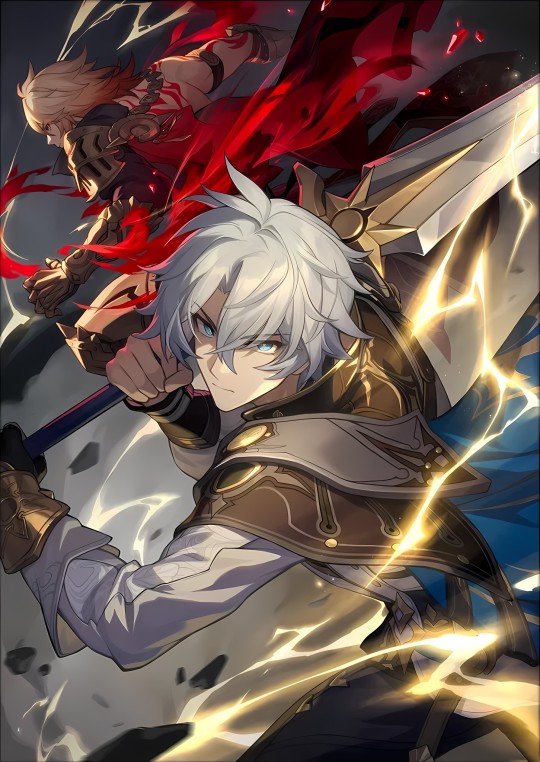

- the closeness phainon & mydei have is very reminiscent of yingxing & dan feng. like i get this feeling that this is what it would've been like to witness yingxing and dan feng together on-screen
- both blade & mydei Can Not Die
- both phainon & dan heng are associated with the path of trailblaze (one way or another)
- dan heng directly relates to mydei's conflict of letting go of the past to go towards the future
- cloud piercer being broken On Amphoreus Specifically by Phainon Specifically and having him allude to blade -- definitely says something.
also, TB's memory of dan heng & blade being brought up in amphoreus for some reason (of course it's moreso astral express vs stellaron hunters, but renheng are inherently tied to that dichotomy anyways)
more in-depth spoilers ahead
- blade got corrupted by the abundance motherfuckers. i have a very strong suspicion that mydei might become corrupted by the black tide, and then i think phainon is going to kill mydei. #tragicyaoi
either way, no matter what happens here, something bad is going to happen to them
- with the reaver being commonly theorized to be another phainon from the future or another timeline, we have the dual persona with reaver - phainon and dan heng - dan feng. both the flame reaver and dan heng walk a different path than their other self. (i think this even adds more meaning to dan heng's heavily involved presence on amphoreus at the moment)
- if blade & mydei cannot die, it might be the case that only dan heng & phainon (reaver) are capable of killing them. or rather, it's only dh/phainon that blade/mydei wants, to be the one to kill them.
- they are part of a group of worshipped heroes, but that group will meet a tragic end? chrysos heirs and high cloud quintet. largely at the hands of phainon (flame reaver) : dan feng. i think something will happen to phainon that will make him parallel dan feng even more
- the chrysos heirs, after they die, will probably be reborn somehow in the "new world/genesis" they're working towards. part of the prophecy is that all but one person will die(?) before the coming of the new world, and that one person will open the path to the new world. which imo reflects how all of the high cloud quintet got reborn/corrupted except for jing yuan
what this means for both pairings & the story?
honestly, i do enjoy how hsr has parallels all over the place, and it might be a testament to how well these two dynamics work, that phaidei & renheng might be the most popular hsr m/m pairings. (side note, for some reason i'm more partial to myphai 🤔 but that's irrelevant)
on top of that, by drawing these parallels, we can further understand just How Doomed phainon & mydei are (as are the rest of the chrysos heirs), and how closely intertwined dan feng & yingxing might have been in the past -- to the point their conflict and feelings are still relevant in the current day as dan heng and blade. even if they're at conflict with each other, there is still such a deep connection that shapes them so profoundly, it cannot be overlooked..
(everything after this is incoherent yapping that i'm not entirely sure about myself but it's what's on my mind)
i do think this also further amplifies the trailblaze vs finality dichotomy, if finality is to be the 3rd path of amphoreus, and if finality is to be associated with the 3 titans of calamity (which mydei = strife is associated with one of those.)
the main thing that marks a significant change in both of these dynamics is the influence of trailblaze. we already know with dan heng joining the path of trailblaze, he wants to come to terms w/ his past in his own way and seek a new future for himself. he's making a meaningful change in his own life. (i do believe he's only getting started in this, the conflict he has with blade, the relationship between astral express & stellaron hunters -- not to mention future involvement w/ xianzhou politics -- will definitely span over the long, long run of HSR as a whole). we don't know if or how dh & blade would ever reconcile, but the paths they now walk on this grand script of "honkai star rail" might lead to an answer later down the road...
in the case of amphoreus, going off the theory they're in a time loop and the flame reaver is a key part of that time loop -- if in previous loops mydei would die or become corrupted at the hands of phainon/reaver, that is "finality" at work -- the endless endings. "trailblaze" is the element that interrupts that, and is what phainon is meant to wield. the trailblazers' appearance in the story would be what diverges the loop and helps phainon become the "nameless hero/king" he is destined to become ...
the really spicy, awesome thing about both these pairings is just how strongly intertwined they are with the overarching plot of their respective stories, and the themes so strongly present in duality and opposition, it's just so good to dig into 😭🙏 and just how much they parallel EACH OTHER too and how important dan heng himself even is to amphoreus too, it's like. god. in analyzing the things that affect their relationship, you're not only analyzing just that, but also the larger story in general and. aouujgjgkhghhh it's so good, it's so good. let them cook we love yaoi star rail
133 notes
·
View notes
Text
You know, there have been traditionally very few romances, in any media, that compel me. I am not a very romantic person, y'all. I'm the kind of person that plays a videogame and thinks of all the broken number combos I can make.
But I think I finnally understand what is it about this story that compels me so much, and I think this is very nice to know for when I eventually write my own novel (it will happen. One day...)
Number 1: Its a classical example of emerging storyline.
They say that in writing there are two types of writers/stories.
Gardners and Discoverers.
A garden story is one where everything is carefully placed from the start. There is a plan, an outline.
A discovery story is one where the story is more or less carried by the characters. The events happen from what the characters would be more likely to do.
Both of these approaches have their great advantages and disadvantages. But Id argue that in romance, we pretty much ONLY see the first, which leads to its flaws becoming disproportionally visible.
Most romances are made to be carefully planned, with a start, middle and finish.
The issue of that is that you get characters that are mostly collections of tropes meant to fill a dynamic, usually a very steriotypical one.
And what I like about KC2 is that it seems, at least to me, very clearly that Hans is NOT that case. He is very much not intended as a character primarily to be a love interest. He is, but the core of his story still exists even if you dont.
Of course, Vavra says that a Hans romance was always the intention and they simply couldnt do it, but I dont believe that was the case. And THAT'S GOOD, at least to me.
It means that the romance came about from the writers conceiving the arcs for these two characters, in a way that is plot relevant, and after that realizing that a romance between them made total sense given what they had written.
And that led to the amazing stort we have right now.
Number 2: You know, I really love the charcter of Hans in particular. And I specially love the frustration that the character clearly feels:
I've said it before how I find it very telling how the only character that Hans ever shows genuine, and very obvious in that, jealousy is not any of the female love interests, its SAM. And that to me, compared to the other things that he says in the story, is very telling to me about how exactly Hans SEES himself in Henry's life.
Hans sees himself as the Galehaut to Henry's Lancelot, his comrade in arms, his KNIGHT. Of course, he often ends up being the Peach to Henry's Mario hehehe, but that's precisely where his frustration comes from: he wants to be Henry's equal (perhaps the only time in his life he ever WANTED to be someone's equal), not his lord. He wants to go into battle with Henry and save him, which is why he immediatly volunteers to a suicide mission the moment Henry does.
That is the way he chose to conceptualize his love for Henry, because no typical heteronormative narrative he has thought all his love fits. He cant seduce Henry the way he would one of his many flings. It wouldnt work.
That... ressonates with me a lot as a queer man who never saw himself in most romance media. Even most BL media tends to have a very traditional "This is the dominant masculine one" and "This is the feminine submissive one" dynamic that feels very alien to anything I have ever experienced.
It also contextualizes why one of Hans objectives is to essentially go on Crusade with Henry, because of course it is. Its the epitome of the ideal that he has on his head for their ideal life: errant noble knights adventuring around the world, seducing pretty mais together, and being FREE.
Its why I believe the "I want to live a life of adventure" line in Henry's conversation with his parents was made with Hans in mind.
.....
Its basically it. I think that's what compels me in this story so much. Im gonna keep this in mind in the future when I finnaly have time to write hehe.
99 notes
·
View notes
Text
I've been thinking about the fandom's attitude toward trauma, and I find it deeply problematic. I'm going to ramble a bit about it.
Here's the thing, either people completely dismiss the element of trauma in the story, or they turn it into a free-pass that can excuse any future shitty behavior from the character.
Specifically, when it comes to Wei Wuxian, I see that his childhood trauma from losing his parents and being left to beg on the streets, and from being made a scapegoat by Yu Ziyuan - who was extremely abusive towards him, both physically and emotionally - to the war, the trauma of being thrown into the burial mounds, and everything that happened from the moment he created the ghost path of cultivation until the first siege of the burial mounds and his death, can all be minimized or all together dismissed by certain parts of the fandom when analyzing his actions in the first life. That's part of why I hate takes that portray Wei Wuxian as oblivious to Lan Wangji's feelings or too emotionally unintelligent to understand the romance, when, actually, there was a ton of shit going on in his life and he absolutely had no energy left to think about romance, of all things. The trauma also becomes progressively more relevant when we look at Wei Wuxian's actions towards the end of his first life - because traumatic experiences kept piling up - and when we get to the battle of Nightless City and later the first siege of the Burial Mounds, it's basically impossible to separate Wei Wuxian's actions and reactions from the trauma he'd endured up until that point.
On the other hand, the certain parts of the fandom really emphasize Jiang Cheng's trauma way beyond the point where it would be relevant to do so.
Yes, Jiang Cheng had an awful childhood because his mother was abusive towards everyone around her. And I can excuse his poor temper when he was a child based on that.
And it's true that losing his parents and sect was traumatic. However, the problem is that in Jiang Cheng's case, his trauma has frequently been used to justify and, in fact, to excuse, all the atrocities he went on to commit in his adult life.
Wei Wuxian, despite his trauma, never became the abuser. In every instance where he used violence, it was either during the war, or he was provoked first. He never took the initiative to be violent or to hurt others otherwise.
Jiang Cheng was completely different. He lashed out because of jealousy and a desire to satisfy his own ego, he betrayed Wei Wuxian and the Wen Siblings, knowing that he owed them his life. And yet, his stans will insist that his past trauma is enough to excuse this behavior. I'm not going to go into how Jiang Cheng's actions were entirely voluntary in this post. Suffice to say that the book makes it quite clear that he turned against Wei Wuxian not because Wei Wuxian's prominence hurt his ego, and the other sect leaders exploited that. But the Jiang sect wouldn't have been in danger had Jiang Cheng chosen not to turn against Wei Wuxian.
I suppose my point is that at some point, trauma can no longer excuse bad behavior. And in this case, when a sane adult chooses to commit genocide, that choice cannot be excused by anything, not even by a traumatic past. When his stans say that he was a victim, they forget about his victims. Sometimes, a victim goes on to become the perpetrator.
In the novel, several characters have extremely traumatic pasts. Wei Wuxian, Jiang Cheng, Jin Guangyao. Most characters, really.
MXTX draws very clear parallels between Wei Wuxian and several of those characters. Wei Wuxian and Jin Guangyao both have a lower background in a world that bases a person's value on their birth. Jiang Cheng and Wei Wuxian both lived with Yu Ziyuan for several years, they both watched Lotus Pier fall, they both lost Jiang Yanli. Wei Wuxian and Xue Yang both came from a lower social background, they were both street kids at one point, they were both victims of societal injustice.
And yet, Wei Wuxian chose to break the cycle of abuse. No matter how much abuse he endured, how traumatic his past, he didn't go on to become the next monster, the next abuser. On the contrary, he actively chose to be kind and just and nurturing. He was only ever violent when he was forced to be so - when he had to defend himself or others. Even in Nightless City, after he'd just lost Wen Ning and Wen Qing, he wasn't the first to attack.
On the other hand, Jiang Cheng, Jin Guangyao, Xue Yang, and many others chose to continue the cycle of violence and abuse. And at some point, the trauma in their pasts can no longer excuse their later choices. Those three characters, for instance - I know there are others but I'm not going to list every single MDZS character with a traumatic past who went on to become shitty people themselves, otherwise I'd be here all day - ruined many lives themselves, often those of people who were completely unrelated to their own traumatic pasts.
And if their actions are excused because of trauma, then what about their victims? What about the Wen remnants, who were old, disabled people, and a toddler, all innocent of Wen Rouhan's crimes? What about the people Jiang Cheng captured and murdered under the suspicion of the being demonic cultivators, on the off chance of them being Wei Wuxian? And the book doesn't even confirm that those people were actually demonic cultivators, they were taken because they were suspected of being such. And nowhere in the book does it say that any of those people did anything wrong at all. And what about Qin Su and her child? What about the entire clan Jin Guangyao framed for murdering his son and exterminated under such an excuse? What about the people of Yi city? What about Xiao Xingchen, Song Lan and a-Qing? What about the nameless, innocent victims who didn't get justice?
A traumatic past can never excuse the trail of victims they left behind.
143 notes
·
View notes
Text
house md rewatch: 1x09, "DNR"

overwhelmed at the thought of writing this recap because this episode is so full of The Good Stuff.
first and foremost - we love omar epps in this house! he was so brilliant in this episode. his ability to differentiate foreman's frustration for 3 different audiences - house; chase and cameron; dr. hamilton - carried the whole experience. and foreman's genuine embarrassment when house heard foreman say that he has no humility, but letting his beliefs supersede that embarrassment? ugh. i love it. thank you again, omar.
much like 1x05, this episode is another exercise in house vs. authority/other belief systems, the opposition in this case being the ethics of a DNR. it doesn't surprise me that house is anti-DNR (surely this has no implications for later seasons...), but it was surprising that cameron, chase, and even cuddy seem at least slightly opposed, too. maybe this is a common point of contention among doctors. obviously i have no idea. but cuddy doesn't penalize/chew house out for keeping the patient, john henry, alive like we expect her to. instead, she reveals that 1) she's had a $50k discretionary fund for house's legal fuck-ups ever since he started, and 2) she's going to help lawyer-him-up. a rare case of ethical similarities between them!

lodging a complaint directly @ season 1 - where is cuddy!! i miss her!! get her back in these episodes for more than 30 seconds!!
i'll also wager that this is the episode that confirms (in season 1's small way) that foreman does not like house. but oh man does he respect him. foreman doubts his coworkers very moral codes because they're seemingly unbothered by house's behavior. regardless of foreman's opinion of DNRs, his integrity keeps him from violating it. integrity and humility are exceptionally valuable to foreman at the episode's start, both of which house dismantles during their third act confrontation.

this is by far the most impassioned that we've seen house, which lends a whole lot of credence to cameron's theory that, if house tries to convince foreman to stay, it implies that he needs him. everyone point and laugh at the misanthrope who broke his misanthropy! for a guy who doesn't even like him, no less!
within this, too, house admits to holding foreman in high regard. when he asks foreman who he thinks the better doctor is - house or hamilton - he says that it won't affect his opinion of himself, but it will affect how he sees foreman, because if foreman acquiesces to hamilton's shallow way in the world, then foreman has failed. then house has failed foreman.
and, of course, the visual politics here are pretty flagrant, but pretty awesome, nonetheless. foreman is so anxious about becoming house (something that he'll repeatedly try to escape in the future, as we know) that he's physically manipulating himself in a way that neither he nor house sits like naturally, only to later sit like as a person usually would in a heated exchange with an authority figure:


i think house's speech to foreman bears repeating here because it does 2 things: codifies the pretty global opinion regarding medical professionals that house md inspired, and also feeds more into House As God.
"you took a chance. you did something great. you were wrong. but it was still great. you should feel great that it was great. you should feel like crap that it was wrong. that's the difference between him and me. he thinks you do your job, and what will be will be. i think that what i do and what you do matters."
this works on foreman. he stays. that's how upstanding he is. he's willing to work with someone who does, in fact, abuse the hell out of him, because they coalesce on a singular, but massively important point: what they do matters. it saves people.
relevant anecdote: i have a long medical history from childhood and resulting medical trauma (which is the reason i put off watching this show for a decade!). so when i say that i'd rather have a doctor like house, who finds the solution, rather than basking in apology and self-doubt, like what he sees in hamilton, i mean it. i think a lot of people came to feel this way, too.
what also comes of this exchange is house's stalwart belief that he can control everything, that he can exist beyond the legal, ethical, moral, etc. confines of the system in which he works. he rejects the premise of a DNR because it signifies giving up (in his mind); it signifies a voluntary failure to solve the puzzle, which, we know, alludes to house actually caring about people, despite claiming the contrary. i'll say it a million times: someone doesn't make their purpose in life healing PEOPLE if they don't care about PEOPLE. go to a research lab, greg, if you truly hate humanity.

house's half of the episode is devoted to unpacking What He Does and its implications for the rest of his life. his anger toward foreman also comes from how he sees himself in john henry, a musician whose illness and disability have taken from him what he loves most. he and foreman butt heads about this dilemma at the very top of 1x09 when house says ALS is "a disease of exclusion...it's a death sentence," and foreman replies with, "that doesn't make it wrong."
1x09 quickly and blatantly draws the parellel between john henry and house, going so far as to grant them a conversation about how they're both "south from normal" on account of their respective obsessions: music and medicine. in a rare moment of canonical introspection, house understands and agrees with john. BUT, because he's opposed to the DNR, he can't make the same inner peace with the "failure" that he sees in john. he takes him to the MRI anyway and ends up curing the guy, of course.

the reason this episode is so good on so many accounts is that it doesn't settle for that one parallel between doctor and patient. it reiterates it in the last few minutes, while also finally addressing house's most obvious/most overlooked problem: his vicodin. after successfully playing god, disproving ALS, and helping john henry walk again, they encounter each other in the hospital lobby, each holding the physical representation of their One Thing, music (john's trumpet) and medicine (house's leather bag).
despite being so desperate in dragging john henry away from "failure," house appears slightly gloomy at seeing john henry so rejuvenated. when he asks house where he can buy canes, house says in a wry voice, "you'll be jogging before you need a second one." audiences still don't know how house became disabled, but it's seeming more and more like a tragic accident that can't be healed. he brought back john from the brink, but he's stuck in his own leeway not far behind.
when john henry gives house his trumpet, he's giving up his One Thing. he's achieved an inner peace - only through house's dedication to his One Thing, solving the puzzle - and can move onto a new phase of his life. house feels that he can't, so he pops a vicodin.

so, finally, john henry asks of house what we've been dying to know for 9 episodes now: "how many of those pills are you taking?" with the unspoken "and why?"
house gives his telltale answer for the first time: "i'm in pain."
even for the audience, the walls are back up. that was the biggest glimpse we're getting for the time being, especially since those who are most aware of his addiction - cuddy and wilson - are so desensitized to it.
i love this one! a whole lot! tbh i'm having a much better time with season 1 than i expected. i watched so much of it in an excited rush for the first time that i missed some of the gems in every episode.
OH. and wilson was there. the courtroom scene was funny but kinda irrelevant to any analysis i could bring up here, but check out how good he looked during it:

#house md#malpractice md#greg house#james wilson#allison cameron#eric foreman#robert chase#lisa cuddy#cameron#foreman#house md rewatch#cuddy#chase#season 1#rewatch 1
69 notes
·
View notes